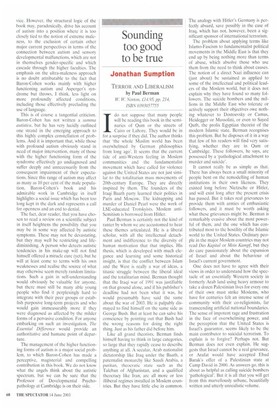Sounding too good to be true
Jonathan Sumption
TERROR AND LIBERALISM by Paul Berman
W Norton, £14.95, pp. 214, ISBN 0393057755
Ido not suppose that many people will be reading this book in the seminaries of Qum or the streets of Cairo or Lahore. They would be in for a surprise if they did. The author thinks that the whole Muslim world has been overwhelmed by German philosophies from long ago'. It seems that the current tide of anti-Western feeling in Moslem communities and the fundamentalist movement which have called for violence against the United States are not just similar to the totalitarian mass movements of 20th-century Europe. They are directly inspired by them. The founders of the Iraqi Baath party learned their politics in Paris and Moscow. The kidnapping and murder of Daniel Pearl were the work of LSE-educated Trotskyists. Moslem antiSemitism is borrowed from Hitler.
Paul Berman is certainly not the kind of ranter by whom we are accustomed to hear these themes articulated. He is a liberal scholar, with all the intellectual detachment and indifference to the diversity of human motivation that that implies. His thesis, which is developed with much elegance and learning and some historical insight, is that the conflict between Islam and the West is really a war of ideas, a titanic struggle between the liberal ideal and the totalitarian mind. Berman thought that the Iraqi war of 1991 was justifiable on that ground alone, and if his publisher's deadline had not been what it was, he would presumably have said the same about the war of 2003. He is palpably dismayed to find himself on the same side as George Bush. But at least he can salve his conscience by pointing out that Bush had the wrong reasons for doing the right thing. Just as his father did before him.
Like all grand theorists, Berman finds himself having to think in large categories, so large that they rapidly cease to describe anything at all. A secular, Arab nationalist dictatorship like Iraq under the Baath, a paternalist monarchy like Saudi Arabia, a puritan, theocratic state such as the Taleban of Afghanistan, and a qualified theocracy like Iran, are all more or less illiberal regimes installed in Moslem countries. But they have little else in common. The analogy with Hitler's Germany is perfectly absurd, save possibly in the case of Iraq, which has not, however, been a significant sponsor of international terrorism.
The problem about applying terms like Islamo-Fascism to fundamentalist political movements in the Middle East is that they end up by being nothing more than terms of abuse, which absolve those who use them from the need to think about causes. The notion of a direct Nazi influence can (just about) be sustained as applied to some of the intellectual and political leaders of the Moslem world, but it does not explain why they have found so many followers. The suicide bombers and the millions in the Middle East who tolerate or actively support their objectives owe nothing whatever to Dostoevslcy or Camus, Heidegger or Mussolini, or even to Sayed Qutb, the prolix Egyptian theorist of the modern Islamic state. Berman recognises this problem. But he disposes of it in a way that few of his readers will find very satisfying, whether they are in Qum or Cambridge. These followers, he says, are possessed by a 'pathological attachment to murder and suicide'.
It cannot really be as simple as that. There has always been a small minority of people bent on the remodelling of human institutions in their own likeness. They existed long before Nietzsche or Hitler, and will exist long after the present crisis has passed. But it takes real grievances to provide them with armies of enthusiastic followers, and it must be worth asking what these grievances might be. Berman is remarkably evasive about the most powerful of them, and the one which has contributed most to the hostility of the Islamic world to the United States. Ordinary people in the major Moslem countries may not read Das Kapital or Mein Karnpf, but they do care passionately about the expansion of Israel and about the behaviour of Israel's current government.
One does not have to agree with their -views in order to understand how the spectacle of an essentially Western society in formerly Arab land using heavy armour to take a dozen Palestinian lives for every one of their own must strike Moslems, who have for centuries felt an intense sense of community with their co-religionists, far transcending artificial national boundaries. The sense of impotent rage and frustration in the face of overwhelming power, and the perception that the United States is Israel's guarantor, seems likely to be the main contributor to suicidal terrorism. To explain is to forgive? Perhaps not. But Berman does not even explain. He suggests that Israel cannot be a real grievance, or Arafat would have accepted Ehud Barak's offer of a Palestinian state at Camp David in 2000. As answers go, this is about as helpful as calling suicide bombers 'pathological'. But it is all that you will get from this marvellously urbane, beautifully written and utterly unrealistic volume,


































































































 Previous page
Previous page